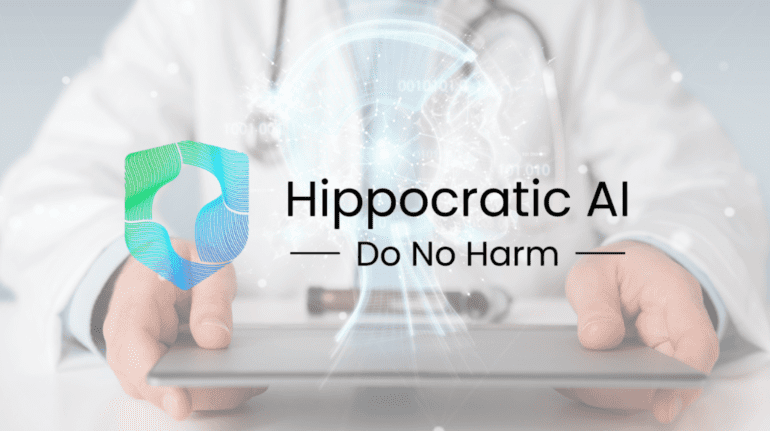TL;DR:
- Hippocratic AI forms a Physician Advisory Council comprising expert physicians from prominent healthcare institutions.
- The council’s role is to guide the development of a safety-focused Large Language Model (LLM) for healthcare.
- The LLM initially focuses on patient-facing, non-diagnostic applications.
- Hippocratic AI’s model outperforms GPT-4 in over 100 healthcare certifications.
- The council’s diverse expertise ensures compliance with quality, safety, and patient care standards.
- Council members support product development, offer insights on patient experiences, and address medical topics.
- Generative AI is seen as a transformative force in healthcare, and the council aims to ensure safe and ethical AI deployment.
Main AI News:
In a significant stride toward revolutionizing healthcare, Hippocratic AI has introduced its esteemed Physician Advisory Council, comprising renowned physicians from distinguished US healthcare institutions and digital health enterprises. This council will play an instrumental role in the development of Hippocratic AI’s safety-focused Large Language Model (LLM), ensuring its readiness for secure deployment.
Hippocratic AI, recognized for its groundbreaking initiatives in the healthcare sector, has garnered praise for assembling a team of pioneering physicians. These experts, who are leading the charge in their respective medical fields, are now dedicating their expertise to shaping the first-ever safety-focused LLM for healthcare. This monumental endeavor aims to empower healthcare professionals while expanding patient access to high-quality care.
Dr. Meenesh Bhimani, Co-Founder and Chief Medical Officer of Hippocratic AI, expressed his enthusiasm, stating, “These pioneering physicians are on the front lines of progress and innovation in their respective specialties. Now, in helping shape the first safety-focused LLM for healthcare, they’re poised to empower the broader healthcare workforce, while simultaneously increasing patient access to high-quality care.”
The distinguished members of the Physician Advisory Council include:
- Dr. Hansa Bhargava: Former Senior Medical Director at WebMD, Former Chief Medical Officer at Medscape, and Executive Member of the Council for Communications/Media at the American Academy of Pediatrics. Dr. Bhargava is also a Staff Physician at Children’s Healthcare of Atlanta.
- Dr. Mike Roizen: Chief Wellness Officer Emeritus at Cleveland Clinic and New York Times Best-Selling Author of “RealAge,” “YOU,” “What to Eat When,” and the Great Age Reboot book series.
- Dr. Peter Provonost: Chief Clinical Transformation Officer at University Hospitals.
- Dr. Chad Perlyn: President of Nicklaus Children’s Pediatric Specialists and Senior Vice President of Nicklaus Children’s Health System.
- Dr. Shayan Vyas: Former Medical Officer at Teladoc Health.
- Dr. John V. Prunskis: Chief Medical Officer/Principal at DXTX Pain and Spine and Co-Author of the US Department of Health and Human Services Best Practices Pain Task Force Final Report.
- Dr. Abe Warshaw: Senior Vice President & Chief Medical Officer at LiveOnNY and former SVP, Chief & Medical Director of Access Services at Mount Sinai Health Systems.
Hippocratic AI’s primary mission is to develop the healthcare industry’s first safety-focused LLM, with a primary focus on patient-facing, non-diagnostic applications. Already surpassing GPT-4 in over 100 healthcare certifications, Hippocratic AI credits its success to reinforcement learning with human feedback, training on healthcare-specific vocabulary, and building the model from the ground up. The formation of the Physician Advisory Council underscores Hippocratic AI’s unwavering commitment to creating the safest and most medically precise LLM possible.
The diversity of healthcare professionals within the Council reflects Hippocratic AI’s belief in the necessity of various perspectives to ensure the model’s compliance with medical quality, safety, and patient care delivery standards across multiple healthcare delivery models. Council members will actively support product development, offer insights into patient experiences and medical care pathways, and serve as valuable resources on medical topics such as clinical workflows, patient engagement protocols, safety and quality policies, and clinical education.
Dr. Bhargava emphasized the transformative potential of generative AI in healthcare, stating, “We are already starting to see massive opportunities for generative AI to transform healthcare. In order to fully realize this potential, leading developers need industry professionals alongside them to ensure the technology is built safely.”
Dr. Prunskis expressed his enthusiasm for his role on the council, saying, “I am pleased to be on the founding Physician Advisory Council of Hippocratic AI to harness and develop the capabilities of artificial intelligence, to the benefit of both patients and physicians.”
Dr. Roizen echoed his sentiments, adding, “I’m a big believer in Hippocratic AI’s deep-rooted collaborative vision. This team is committed to tapping into RLHF and hands-on expertise from those who today perform many of the non-diagnostic tasks an LLM might handle.”
Dr. Vyas concluded by emphasizing the importance of trust in AI in healthcare, stating, “Building a safe and scalable large language model for healthcare requires deep consideration of the nuances of patient care and a commitment to transparency, security, and privacy. Establishing trust will be a critical asset in paving the way for AI in healthcare.” He looks forward to working closely alongside Hippocratic AI and leading physicians to guide the development of this transformative technology.
Conclusion:
The formation of Hippocratic AI’s Physician Advisory Council signifies a significant step toward advancing the development of a safety-focused LLM for healthcare. This initiative underscores the importance of collaboration between leading AI developers and healthcare professionals to ensure the responsible and secure integration of AI technology into the healthcare sector. As generative AI continues to show promise in healthcare, the involvement of industry experts will play a pivotal role in shaping the future of healthcare AI applications and ensuring trust and transparency in their adoption.

